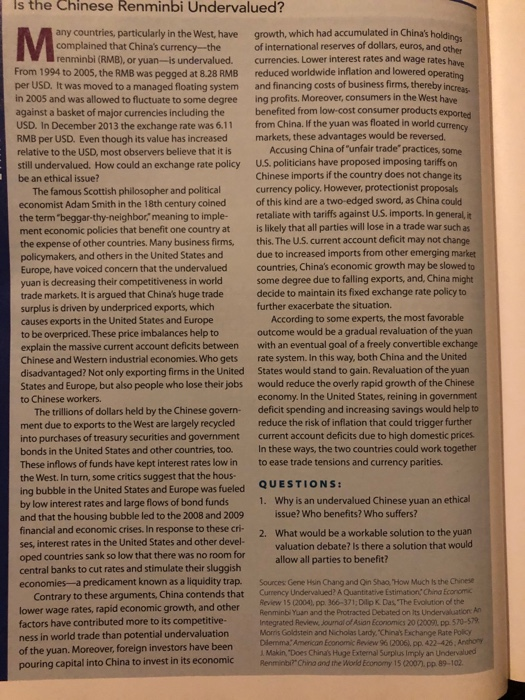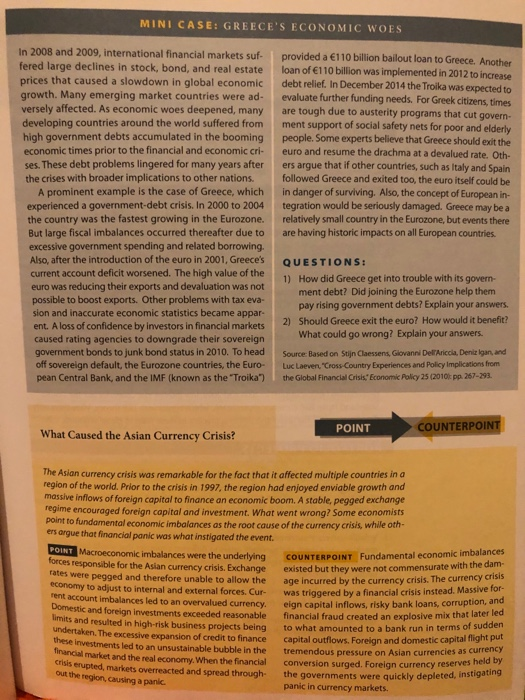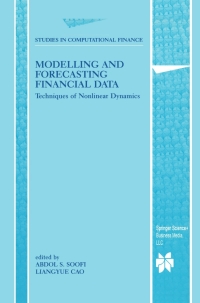Ch. 4: Chinese Renminbi Valuation case (p. 98) From the consumer-, firm-, nation-, competitor-, and trade partner-level, what are the specific ethical, business, and policy issues. Analyze this case utilizing content (specific vocab & theories) from any relevant chapters read this semester; do not repeat information that other students have posted, unless you are extending the analysis.
Ch. 4: Greece's Economic Woes case (p. 111) From the citizen-, firm-, nation-, competitor-, and other EU member's-level, analyze the specific ethical, business, and policy issues utilizing concepts and theories studied this semester. Investigate the nation's current economic status and future prospects.
Ch. 14 Global Financial System & Brexit Given that London is considered one of the major global financial centers, how does the Brexit event specifically impact Englands, the European Union, and global economies? Analyze e the forecasted consequences and advantages?
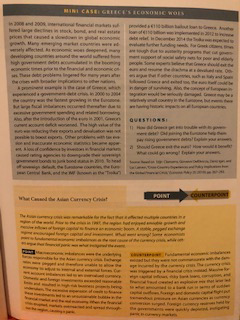
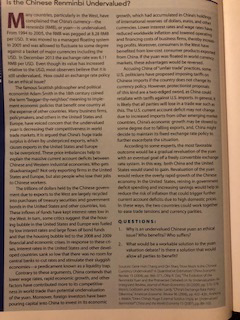
bi Under Is the Chinese Renminbi Undervalued? any countries, particularly in the West, have complained that China's currency--the renminbi (RMB), or yuan-is undervalued From 1994 to 2005, the RMB was pegged at 8.28 RMB per USD. It was moved to a managed floating system in 2005 and was allowed to fluctuate to some degree against a basket of major currencies including the USD. In December 2013 the exchange rate was 6.11 RMB per USD. Even though its value has increased relative to the USD, most observers believe that it is still undervalued. How could an exchange rate policy be an ethical issue? The famous Scottish philosopher and political economist Adam Smith in the 18th century coined the term "beggar thy neighbor' meaning to imple ment economic policies that benefit one country at the expense of other countries. Many business firms policymakers, and others in the United States and Europe, have voiced concern that the undervalued yuan is decreasing their competitiveness in world trade markets. It is argued that China's huge trade surplus is driven by underpriced exports, which causes exports in the United States and Europe to be overpriced. These price imbalances help to explain the massive current account deficits between Chinese and Western industrial economies. Who gets disadvantaged? Not only exporting firms in the United States and Europe, but also people who lose their jobs to Chinese workers. The trillions of dollars held by the Chinese govern- ment due to exports to the West are largely recycled into purchases of treasury securities and government bonds in the United States and other countries, too. These inflows of funds have kept interest rates low in the West. In turn, some critics suggest that the hous- ing bubble in the United States and Europe was fueled by low interest rates and large flows of bond funds and that the housing bubble led to the 2008 and 2009 financial and economic crises. In response to these cri- ses, interest rates in the United States and other devel- oped countries sank so low that there was no room for central banks to cut rates and stimulate their sluggish economies- a predicament known as a liquidity trap. Contrary to these arguments, China contends that lower wage rates, rapid economic growth, and other factors have contributed more to its competitive- ness in world trade than potential undervaluation of the yuan. Moreover, foreign investors have been pouring capital into China to invest in its economic growth, which had accumulated in China's holdine of international reserves of dollars, euros, and other currencies. Lower interest rates and wage rates han reduced worldwide Inflation and lowered operatina and financing costs of business firms, thereby incro ing profits. Moreover, consumers in the West have benefited from low-cost consumer products exported from China. If the yuan was floated in world currency markets, these advantages would be reversed. Accusing China of "unfair trade practices, some U.S. politicians have proposed imposing tariffs on Chinese imports if the country does not change its currency policy. However, protectionist proposals of this kind are a two-edged sword, as China could retaliate with tariffs against U.S. Imports. In general is likely that all parties will lose in a trade war such this. The U.S. current account deficit may not change due to increased imports from other emerging market countries, China's economic growth may be slowed to some degree due to falling exports, and, China might decide to maintain its fixed exchange rate policy to further exacerbate the situation. According to some experts, the most favorable outcome would be a gradual revaluation of the yuan with an eventual goal of a freely convertible exchange rate system. In this way, both China and the United States would stand to gain, Revaluation of the yuan would reduce the overly rapid growth of the Chinese economy. In the United States, reining in government deficit spending and increasing savings would help to reduce the risk of inflation that could trigger further current account deficits due to high domestic prices In these ways, the two countries could work together to ease trade tensions and currency parties QUESTIONS 1. Why is an undervalued Chinese yuan an ethical issue? Who benefits? Who suffers? 2. What would be a workable solution to the yuan valuation debate? Is there a solution that would allow all parties to benefit? Sources Gene Hun Chang and in Shaa How Much Is the Chinese Currency Undervalued? A Quantitative Estimation China Economic Review 15 (2004), pp. 366-371 Dilip Das "The Evolution of the Renminbi Yuan and the Protracted Debated on its Undervation An Integrated Review, Journal of Asian Economics 20 (2009. pp. 570-579 Morris Goldstein and Nicholas Lady China change Rate Policy Dilemma'American from 2006, 47-426 Anthony Makin "Does China Huge External Surplus imply an Undervalued Renminbi China and the World Economy 15 2007. pp. 89-102 MINI CASE: GREECE'S ECONOMIC WOES In 2008 and 2009, international financial markets suf- fered large declines in stock, bond, and real estate prices that caused a slowdown in global economic growth. Many emerging market countries were ad- versely affected. As economic woes deepened, many developing countries around the world suffered from high government debts accumulated in the booming economic times prior to the financial and economic cri- ses. These debt problems lingered for many years after the crises with broader implications to other nations. A prominent example is the case of Greece, which experienced a government-debt crisis. In 2000 to 2004 the country was the fastest growing in the Eurozone. But large fiscal imbalances occurred thereafter due to excessive government spending and related borrowing. Also, after the introduction of the euro in 2001, Greece's current account deficit worsened. The high value of the euro was reducing their exports and devaluation was not possible to boost exports. Other problems with tax eva- sion and inaccurate economic statistics became appar- ent. A loss of confidence by investors in financial markets caused rating agencies to downgrade their sovereign government bonds to junk bond status in 2010. To head off sovereign default, the Eurozone countries, the Euro- pean Central Bank, and the IMF (known as the "Troika" provided a 110 billion bailout loan to Greece. Another loan of 110 billion was implemented in 2012 to increase debt relief. In December 2014 the Troika was expected to evaluate further funding needs. For Greek citizens, times are tough due to austerity programs that cut govern- ment support of social safety nets for poor and elderly people. Some experts believe that Greece should exit the euro and resume the drachma at a devalued rate. Oth- ers argue that if other countries, such as Italy and Spain followed Greece and excited too, the euro itself could be in danger of surviving. Also, the concept of European in- tegration would be seriously damaged. Greece may be a relatively small country in the Eurozone, but events there are having historic impacts on all European countries. QUESTIONS: 1) How did Greece get into trouble with its govern- ment debt? Did joining the Eurozone help them pay rising government debts? Explain your answers. 2) Should Greece exit the euro? How would it benefit? What could go wrong? Explain your answers. Source: Based on Stijn Claessens, Giovanni Dell'Ariccia, Denilgan and Luc Laeven. "Cross Country Experiences and Policy Implications from the Global Financial Crisis Economie Policy 25 20101 pp 287-29 POINT COUNTERPOINT What Caused the Asian Currency Crisis? The Asian currency crisis was remarkable for the fact that it affected multiple countries in a region of the world. Prior to the crisis in 1997. the region had enjoyed enviable growth and massive inflows of foreign capital to finance an economic boom. A stable, pegged exchange regime encouraged foreign capital and investment. What went wrong? Some economists point to fundamental economic imbalances as the root cause of the currency crisis, while oth ers argue that financial panic was what instigated the event. T Macroeconomic imbalances were the underlying COUNTERPOINY Fundamental economic imbalance aces responsible for the Asian currency crisis, Exchange existed but they were not commensurate with the mensurate with the dam- rates were pe were pegged and therefore unable to allow the age incurred by the currency crisis. The currency crisis economy to adjust to internal and external forces. Cur- rent account was triggered by a financial crisis instead. Massive for- account imbalances led to an overvalued currency lan capital inflows, risky bank loans, corruption, an womestic and foreign investments exceeded reasonable financial fraud created an explosive mix that laterte its and resulted in high-risk business projects being to what amounted to a bank run in terms of su taken. The excessive expansion of credit to finance capital outflows Foreign and domestic capital flight pu whese investments led to an unsustainable bubble in the tremendous pressure on Asian currencies cial market and the real economy. When the financial conversion surged Foreign currency reserves urrency reserves held by crisis erupted, markets overreacted and spread through through the governments were quickly depleted, instigating panic in currency markets. out the region, causing a panic bi Under Is the Chinese Renminbi Undervalued? any countries, particularly in the West, have complained that China's currency--the renminbi (RMB), or yuan-is undervalued From 1994 to 2005, the RMB was pegged at 8.28 RMB per USD. It was moved to a managed floating system in 2005 and was allowed to fluctuate to some degree against a basket of major currencies including the USD. In December 2013 the exchange rate was 6.11 RMB per USD. Even though its value has increased relative to the USD, most observers believe that it is still undervalued. How could an exchange rate policy be an ethical issue? The famous Scottish philosopher and political economist Adam Smith in the 18th century coined the term "beggar thy neighbor' meaning to imple ment economic policies that benefit one country at the expense of other countries. Many business firms policymakers, and others in the United States and Europe, have voiced concern that the undervalued yuan is decreasing their competitiveness in world trade markets. It is argued that China's huge trade surplus is driven by underpriced exports, which causes exports in the United States and Europe to be overpriced. These price imbalances help to explain the massive current account deficits between Chinese and Western industrial economies. Who gets disadvantaged? Not only exporting firms in the United States and Europe, but also people who lose their jobs to Chinese workers. The trillions of dollars held by the Chinese govern- ment due to exports to the West are largely recycled into purchases of treasury securities and government bonds in the United States and other countries, too. These inflows of funds have kept interest rates low in the West. In turn, some critics suggest that the hous- ing bubble in the United States and Europe was fueled by low interest rates and large flows of bond funds and that the housing bubble led to the 2008 and 2009 financial and economic crises. In response to these cri- ses, interest rates in the United States and other devel- oped countries sank so low that there was no room for central banks to cut rates and stimulate their sluggish economies- a predicament known as a liquidity trap. Contrary to these arguments, China contends that lower wage rates, rapid economic growth, and other factors have contributed more to its competitive- ness in world trade than potential undervaluation of the yuan. Moreover, foreign investors have been pouring capital into China to invest in its economic growth, which had accumulated in China's holdine of international reserves of dollars, euros, and other currencies. Lower interest rates and wage rates han reduced worldwide Inflation and lowered operatina and financing costs of business firms, thereby incro ing profits. Moreover, consumers in the West have benefited from low-cost consumer products exported from China. If the yuan was floated in world currency markets, these advantages would be reversed. Accusing China of "unfair trade practices, some U.S. politicians have proposed imposing tariffs on Chinese imports if the country does not change its currency policy. However, protectionist proposals of this kind are a two-edged sword, as China could retaliate with tariffs against U.S. Imports. In general is likely that all parties will lose in a trade war such this. The U.S. current account deficit may not change due to increased imports from other emerging market countries, China's economic growth may be slowed to some degree due to falling exports, and, China might decide to maintain its fixed exchange rate policy to further exacerbate the situation. According to some experts, the most favorable outcome would be a gradual revaluation of the yuan with an eventual goal of a freely convertible exchange rate system. In this way, both China and the United States would stand to gain, Revaluation of the yuan would reduce the overly rapid growth of the Chinese economy. In the United States, reining in government deficit spending and increasing savings would help to reduce the risk of inflation that could trigger further current account deficits due to high domestic prices In these ways, the two countries could work together to ease trade tensions and currency parties QUESTIONS 1. Why is an undervalued Chinese yuan an ethical issue? Who benefits? Who suffers? 2. What would be a workable solution to the yuan valuation debate? Is there a solution that would allow all parties to benefit? Sources Gene Hun Chang and in Shaa How Much Is the Chinese Currency Undervalued? A Quantitative Estimation China Economic Review 15 (2004), pp. 366-371 Dilip Das "The Evolution of the Renminbi Yuan and the Protracted Debated on its Undervation An Integrated Review, Journal of Asian Economics 20 (2009. pp. 570-579 Morris Goldstein and Nicholas Lady China change Rate Policy Dilemma'American from 2006, 47-426 Anthony Makin "Does China Huge External Surplus imply an Undervalued Renminbi China and the World Economy 15 2007. pp. 89-102 MINI CASE: GREECE'S ECONOMIC WOES In 2008 and 2009, international financial markets suf- fered large declines in stock, bond, and real estate prices that caused a slowdown in global economic growth. Many emerging market countries were ad- versely affected. As economic woes deepened, many developing countries around the world suffered from high government debts accumulated in the booming economic times prior to the financial and economic cri- ses. These debt problems lingered for many years after the crises with broader implications to other nations. A prominent example is the case of Greece, which experienced a government-debt crisis. In 2000 to 2004 the country was the fastest growing in the Eurozone. But large fiscal imbalances occurred thereafter due to excessive government spending and related borrowing. Also, after the introduction of the euro in 2001, Greece's current account deficit worsened. The high value of the euro was reducing their exports and devaluation was not possible to boost exports. Other problems with tax eva- sion and inaccurate economic statistics became appar- ent. A loss of confidence by investors in financial markets caused rating agencies to downgrade their sovereign government bonds to junk bond status in 2010. To head off sovereign default, the Eurozone countries, the Euro- pean Central Bank, and the IMF (known as the "Troika" provided a 110 billion bailout loan to Greece. Another loan of 110 billion was implemented in 2012 to increase debt relief. In December 2014 the Troika was expected to evaluate further funding needs. For Greek citizens, times are tough due to austerity programs that cut govern- ment support of social safety nets for poor and elderly people. Some experts believe that Greece should exit the euro and resume the drachma at a devalued rate. Oth- ers argue that if other countries, such as Italy and Spain followed Greece and excited too, the euro itself could be in danger of surviving. Also, the concept of European in- tegration would be seriously damaged. Greece may be a relatively small country in the Eurozone, but events there are having historic impacts on all European countries. QUESTIONS: 1) How did Greece get into trouble with its govern- ment debt? Did joining the Eurozone help them pay rising government debts? Explain your answers. 2) Should Greece exit the euro? How would it benefit? What could go wrong? Explain your answers. Source: Based on Stijn Claessens, Giovanni Dell'Ariccia, Denilgan and Luc Laeven. "Cross Country Experiences and Policy Implications from the Global Financial Crisis Economie Policy 25 20101 pp 287-29 POINT COUNTERPOINT What Caused the Asian Currency Crisis? The Asian currency crisis was remarkable for the fact that it affected multiple countries in a region of the world. Prior to the crisis in 1997. the region had enjoyed enviable growth and massive inflows of foreign capital to finance an economic boom. A stable, pegged exchange regime encouraged foreign capital and investment. What went wrong? Some economists point to fundamental economic imbalances as the root cause of the currency crisis, while oth ers argue that financial panic was what instigated the event. T Macroeconomic imbalances were the underlying COUNTERPOINY Fundamental economic imbalance aces responsible for the Asian currency crisis, Exchange existed but they were not commensurate with the mensurate with the dam- rates were pe were pegged and therefore unable to allow the age incurred by the currency crisis. The currency crisis economy to adjust to internal and external forces. Cur- rent account was triggered by a financial crisis instead. Massive for- account imbalances led to an overvalued currency lan capital inflows, risky bank loans, corruption, an womestic and foreign investments exceeded reasonable financial fraud created an explosive mix that laterte its and resulted in high-risk business projects being to what amounted to a bank run in terms of su taken. The excessive expansion of credit to finance capital outflows Foreign and domestic capital flight pu whese investments led to an unsustainable bubble in the tremendous pressure on Asian currencies cial market and the real economy. When the financial conversion surged Foreign currency reserves urrency reserves held by crisis erupted, markets overreacted and spread through through the governments were quickly depleted, instigating panic in currency markets. out the region, causing a panic


